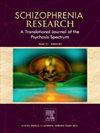Aripiprazole or metformin for hyperprolactinemia in women with schizophrenia: A 6-month, real-world chart review study
IF 3.5
2区 医学
Q1 PSYCHIATRY
引用次数: 0
Abstract
Objectives
Antipsychotic-induced hyperprolactinemia is a relevant clinical issue. In this study, we aimed to evaluate the comparative efficacy of adjunctive aripiprazole and metformin in treating antipsychotic-induced hyperprolactinemia among female patients with schizophrenia.
Methods
A chart review of females diagnosed with schizophrenia and hospitalized from 2010 to 2020, all with antipsychotic-induced hyperprolactinemia and elevated serum prolactin levels. Data included antipsychotic types, baseline and post-intervention prolactin levels. Remission was defined as prolactin levels below 25 ng/dL in females. Cox regression and instrumental variables were used to assess remission hazard ratios at 30, 60, and 180 days.
Results
Among 652 female inpatients (mean age = 38.8 ± 12.7 years; 53.2 % on haloperidol, 17.8 % on risperidone) with hyperprolactinemia (mean baseline prolactin: 69.9 ± 47.8 ng/dL), 366 (56.1 %) received add-on aripiprazole (mean baseline prolactin: 76.5 ± 51.3 ng/dL) and 286 (43.9 %) received metformin (mean baseline prolactin: 61.5 ± 41.6 ng/dL). Aripiprazole was associated with decreased prolactin levels on the 30th day with a remission rate of 73.6 % compared to a 15.0 % remission rate in the metformin group. The effect was significantly greater in the low-dose group (aripiprazole ≤5 mg). Throughout the 180-day follow-up period, the final remission rate was substantially higher in the aripiprazole group than in the metformin group (77.6 % vs 23.1 %). Aripiprazole outperformed metformin in treating hyperprolactinemia induced primarily by haloperidol (remission rate 79.9 %), quetiapine (72.7 %), olanzapine (68.8 %) and risperidone (65.2 %) (all p < 0.01).
Conclusions
This real-world study suggests that adjunctive aripiprazole therapy effectively reduces prolactin levels in females with antipsychotic-induced hyperprolactinemia. Maximum efficacy is achieved at no >5 mg/day and within 30 days.
阿立哌唑或二甲双胍治疗精神分裂症女性高泌乳素血症:一项为期6个月的真实世界图表回顾研究
目的抗精神病药致高泌乳素血症是一个重要的临床问题。在本研究中,我们旨在评价辅助阿立哌唑和二甲双胍治疗女性精神分裂症患者抗精神病性高泌乳素血症的比较疗效。方法回顾性分析2010 ~ 2020年诊断为精神分裂症并住院的女性患者,所有患者均伴有抗精神病药致高催乳素血症和血清催乳素水平升高。数据包括抗精神病药类型、基线和干预后催乳素水平。缓解被定义为女性催乳素水平低于25 ng/dL。Cox回归和工具变量用于评估30,60和180天的缓解风险比。结果652例女性住院患者(平均年龄38.8±12.7岁;氟哌啶醇组53.2%,利培酮组17.8%)伴有高催乳素血症(平均基线催乳素:69.9±47.8 ng/dL), 366例(56.1%)加用阿立哌唑(平均基线催乳素:76.5±51.3 ng/dL), 286例(43.9%)加用二甲双胍(平均基线催乳素:61.5±41.6 ng/dL)。阿立哌唑与第30天泌乳素水平下降有关,缓解率为73.6%,而二甲双胍组的缓解率为15.0%。低剂量组(阿立哌唑≤5 mg)效果更明显。在180天的随访期间,阿立哌唑组的最终缓解率明显高于二甲双胍组(77.6% vs 23.1%)。阿立哌唑治疗氟哌啶醇(缓解率79.9%)、喹硫平(缓解率72.7%)、奥氮平(68.8%)和利培酮(65.2%)引起的高泌乳素血症优于二甲双胍(p <;0.01)。结论:本现实世界的研究表明,辅助阿立哌唑治疗可有效降低抗精神病药诱导的高催乳素血症女性患者的催乳素水平。在不服用5毫克/天的情况下,在30天内达到最大疗效。
本文章由计算机程序翻译,如有差异,请以英文原文为准。
求助全文
约1分钟内获得全文
求助全文
来源期刊

Schizophrenia Research
医学-精神病学
CiteScore
7.50
自引率
8.90%
发文量
429
审稿时长
10.2 weeks
期刊介绍:
As official journal of the Schizophrenia International Research Society (SIRS) Schizophrenia Research is THE journal of choice for international researchers and clinicians to share their work with the global schizophrenia research community. More than 6000 institutes have online or print (or both) access to this journal - the largest specialist journal in the field, with the largest readership!
Schizophrenia Research''s time to first decision is as fast as 6 weeks and its publishing speed is as fast as 4 weeks until online publication (corrected proof/Article in Press) after acceptance and 14 weeks from acceptance until publication in a printed issue.
The journal publishes novel papers that really contribute to understanding the biology and treatment of schizophrenic disorders; Schizophrenia Research brings together biological, clinical and psychological research in order to stimulate the synthesis of findings from all disciplines involved in improving patient outcomes in schizophrenia.
 求助内容:
求助内容: 应助结果提醒方式:
应助结果提醒方式:


